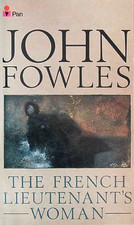Review: ‘The French Lieutenant’s Woman’ by John Fowles

 Title: The French Lieutenant’s Woman
Title: The French Lieutenant’s Woman
Author: John Fowles
Published: Pan Books, 1987, pp. 399. Originally published 1969.
Genre: Historical fiction
Blurb:In this contemporary, Victorian-style novel Charles Smithson, a nineteenth-century gentleman with glimmerings of twentieth-century perceptions, falls in love with enigmatic Sarah Woodruff, who has been jilted by a French lover. (Goodreads.com)
When, where and why: I think my mother picked this book up for me to take on holiday when we went to Charmouth, just along from Lyme Regis, one May half term. However, as my primary focus while on holiday was revision for the upcoming exams this book was neglected in favour of Latin verbs endings (although not by choice). It’s sat on my shelves ever since and I discovered it when I was reorganising some books, an activity I find almost as satisfying as reading them. This OAP definitely qualifies for book 30/50 for my Books Off the Shelf Challenge.
What I thought: The first thing I have written in my reading journal for The French Lieutenant’s Woman is, “I love this book. I’ve only read the first few pages and already I’m completely hooked. I can’t believe I waited to long to read this”. My initial enthusiasm remained undimmed throughout the whole course of the book and it turned out to be one of my favourite reads of this year.
The French Lieutenant’s Woman at times reads exactly like a Victorian novel; Fowles is able to mimic the style impeccably and I often forgot I was reading a modern piece of writing. However, the text is peppered with dry observations on the characters, the Victorians or the process of writing a story that come from such a modern perspective that they jolted me out of this false sense of period and made me aware of what the author was doing. Fowles has a very knowing, self-conscious narratorial voice in these passages which can put some readers off, particularly as they often interrupt the flow of the story. He does like to draw attention to just how clever he is being, but as I whole-heartedly agree with him it’s very difficult to find this an irritating trait. In fact, I thought that Fowles observations and reflections on being Victorian, something obviously impossible in contemporary novels, added an extra layer of richness to the text. He uses the distance and perspective provided by time to make explicit the cultural points of view latent in these Victorian novels and provide commentary on them. I think it’s great that he doesn’t just write a historical novel butinstead uses a historical style and setting to produce something so lucid and clever.
The story centres around Charles Smithson, who is staying in Lyme Regis visiting his fiancee, Ernestina, prior to their wedding. There he meets Sarah Woodruff, also known as Tragedy or, less kindly, as the French Lieutenant’s Woman. As he becomes increasingly fascinated by Sarah he is forced to reexamine his own values as his forthcoming marriage is threatened. Charles is a thoroughly intriguing central character: although not always likeable, he is so open and honest with himself that it is impossible not to sympathise with him as he struggles with doing what is morally right but socially unacceptable. At one point Fowles says:
You will see that Charles set his sights high. Intelligent idlers always have, in order to justify their idleness to their intelligence. He had, in short, all the Byronic ennui with neither of the Byronic outlets: genius and adultery. (p. 19)
I got the impression that Fowles rather likes him even though he may not approve of him. His ‘sinister fondness‘ (p. 17) for spending time in the library, so frowned upon by his uncle, is another trait designed to make him appeal to the reader.
Fowles employs a similar tactic when talking about Sarah and her days at boarding school:
Thus it had come about that she had read far more fiction, and far more poetry, those two sanctuaries of the lonely, than most of her kind. They served as a substitute for experience. Without realising it she judged people as much by the standards of Walter Scott and Jane Austen as by any empirically arrived at; seeing those around her as fictional characters, and making poetic judgements on them. (p. 50)
I know I can identify with this statement, and I’m fairly sure it’s designed to make Sarah appeal to the reader (who, it’s reasonable to assume, has probably read a few books before) and makes her relatable rather than aloof, as she initially appears. I felt I was manipulated into liking her, just as Charles is, while Ernestina on the other hand, the woman with a legitimate claim to affection, is not a sympathetic character at all. She is constantly shown playing games and acting rather than being sincere, a trait which continues even during moments of what should be genuine emotion.
Considering Fowles’ frequent interruptions of the narrative and drawing attention to the fictionality of the characters, I was surprised at how invested I was in Charles and Sarah and what happened to them. Shortly before the end of the novel, Fowles observes:
Fiction usually pretends to conform to the reality: the writer puts the conflicting wants in the ring and then describes the fight — but in fact fixes the fight, letting the want he himself favours win. And we judge writers of fiction both by the skill they show in fixing the fights (in other words, in persuading us that they were not fixed) and by the kind of fighter they fix in favour of: the good one, the tragic one, the evil one, the funny one, and so on. (p. 348)
This explicitly states that there is no ‘real’ ending in fiction, just the author making things work out in his own way, yet still I cared about what ‘really’ happened. This year I’ve discovered that it takes a lot for me to forgive an author messing around with the story: it has to have a point and it has to be well executed. The French Lieutenant’s Woman exhibited both of these qualities and so was a fantastic book from beginning to end.
Where this book goes: I’m definitely keeping this book as it’s one of my favourite books of 2010. However, my copy has been annotated (with the blindingly obvious, which is annoying, rather than with insightful comments which would be quite interesting) so I’ll be on the lookout for a replacement copy as I prowl the charity shops. There’s a particularly attractive Vintage version which I’m hoping to spot.
Tea talk: I’ve been on the Lapsang Souchong again, as it’s been so cold recently. Now that we have heating again (for which I am eternally grateful) I don’t spend my evenings huddled in front of the fire any more, but this tea brings back that lovely smokey smell which I’m missing, surprisingly.